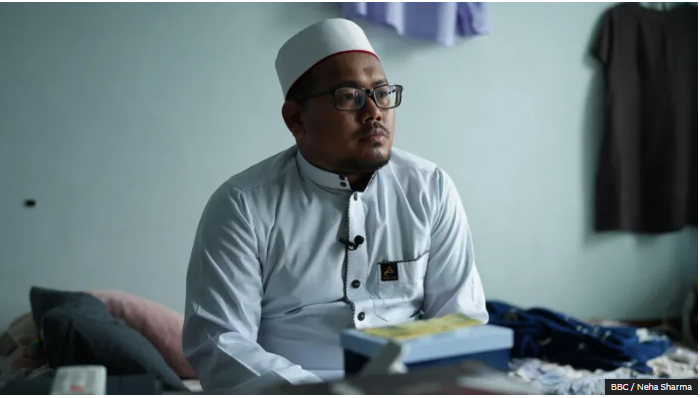
As the call to prayer rang out in Sagaing last Friday, hundreds of Muslims hurried to the five mosques in central Myanmar.
They were eager to hold their last Friday prayers for Ramadan, just days away from the festive period of Eid that would mark the end of the holy month.
Then, at 12:51 local time (06:21 GMT), a deadly earthquake struck. Three mosques collapsed, including the biggest one, Myoma, killing almost everyone inside.
Hundreds of kilometres away, the former imam of Myoma mosque, Soe Nay Oo, felt the quake in the Thai border town of Mae Sot.
In the following days, he found out that around 170 of his relatives, friends and members of his former congregation had died, mostly in the mosques. Some were leading figures in the city’s close-knit Muslim community.
“I think about all the people who lost their lives, and the victims’ children – some of them are young children,” he told the BBC. “I can’t hold back my tears when I talk about this.”
More than 2,700 people have died in the quake which happened near Sagaing and Mandalay, Myanmar’s second city. The death toll is expected to rise as rescuers continue to pull out bodies from rubble.
While the area was known for its ancient Buddhist temples, the cities were also home to a significant Muslim population.
An estimated 500 Muslims died while praying in their mosques, according to figures given by the country’s leader, Min Aung Hlaing, on Monday.
Eyewitnesses in Sagaing have told the BBC that the road where the mosques were, Myoma Street, was the worst hit in the city. Many other houses on the street have also collapsed.
Hundreds of people have sought shelter by the side of the road, either because they are now homeless, or are too afraid to go back to their homes in case there are aftershocks. Food supplies are reported to be scarce.
In Myoma alone, more than 60 people were said to be crushed in the collapse, while scores more died in the Myodaw and Moekya mosques. More bodies were still being pulled out on Tuesday.
There are indications that the worshippers had tried to escape, according to Soe Nay Oo, who has received multiple reports from surviving members of his community.
He currently lives in the Thai city of Mae Sot with his wife and daughter, after escaping from Myanmar soon after a coup that took place in 2021.
There were bodies found outside of the main prayer hall, he said, in the area where worshippers wash themselves. Some were also found clutching other people’s hands, in what looked like attempts to pull them away from the crumbling building.
Among the many loved ones Soe Nay Oo lost was one of his wife’s cousins. Her death, he said, was “the most painful thing that I have endured” in his 13 years as an imam.
“She was the one who showed her love to us the most,” said Soe Nay Oo. “Everyone in the family loved her. The loss is unbearable for us.”
Another of his wife’s cousins, a well-respected businessman who had performed the Islamic pilgrimage to Mecca, also died.
“He always called me Nyi Lay [‘little brother’ in Burmese]…When I married my wife, he said we are family now and he always treated me like his own little brother,” said Soe Nay Oo.
“He was always there for us whenever we needed him. I have lost those whom I love like brothers like him.”
Some of the close friends who died include Soe Nay Oo’s former assistant imam, whom he remembered for his strong work ethic and remarkable talent in reciting the Quran.
The principal of the local public school, who was also the only female trustee of the Myoma mosque, also died. She was remembered by Soe Nay Oo as a generous soul who would often pay for mosque programmes out of her own pocket.
He said every time he hears of yet another person from the community who died, he experiences a new wave of grief. “I feel devastated… it always comes to my mind, the memories I cherish of them.
“Even though they were not close relatives, they were the ones who always welcomed me, followed my prayers, and who prayed together.”
The fact that they died during Ramadan is not lost on him. “All the departed have returned to Allah’s home, I would say. They will be remembered as martyrs accordingly,” he said.








